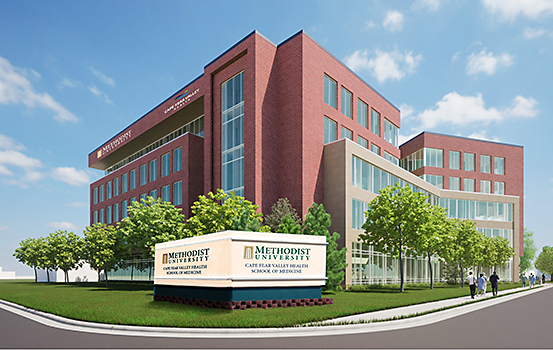 County Leaders Attend City-County Liaison Meeting
County Leaders Attend City-County Liaison Meeting
Cumberland County officials took part in a City-County Liaison Committee Meeting with leaders from the City of Fayetteville, Cumberland County Schools and other organizations within the community. The meeting was held at Fayetteville City Hall.
The meetings, which are typically held every other month, provide County and City leaders with an opportunity to provide updates and discuss issues of mutual interest. Three elected officials from each governing board comprise the Committee, including the chair and vice chair of the Cumberland County Board of Commissioners, as well as the mayor and mayor pro tem for the City of Fayetteville.
County elected officials who attended Thursday’s meeting included Board of Commissioners Chairman Glenn Adams and Commissioner Jimmy Keefe.
During the meeting, one of the topics discussed was a potential Aquatics Center in the County. An Indoor Aquatics Center was among the top recommendations from the 2020 Parks & Recreation Master Plan.
Fayetteville-Cumberland Parks & Recreation Director Michael Gibson presented a possible concept for an Indoor Aquatics Center that would include multiple water elements and other amenities. He discussed a possible cost range for a facility, as well as potential partner organizations that could participate in the project.
Chairman Adams offered for County staff to take the lead in moving the discussion forward at a staff-level. The committee voted unanimously for their respective boards to work through the County to determine the next steps to move an Indoor Aquatics Center forward.
Additionally, City staff presented an update regarding the feasibility of an amusement park located in the County and that next steps would be to engage a consultant to conduct a feasibility study at an estimated cost of $75,000.
Chairman Adams said due to the number of major County capital projects currently in development, the County was not interested in participating at this time.
Other items discussed during the meeting included a presentation on the City’s Comprehensive Pedestrian Plan Study and an update from Cumberland County Schools.
Learn more about Cumberland County by visiting cumberlandcountync.gov, and by following the County on YouTube, CCNCTV Spectrum Channel 5, and social media by searching for CumberlandCountyNC.
Methodist University Cape Fear Valley Health School of Medicine Receives $8 Million from Golden LEAF Foundation
Golden LEAF, established in 1999 to administer a portion of tobacco settlement agreement monies back into North Carolina's rural and economically distressed communities, announced it has awarded $8 million to the new school of medicine.
“Research has shown that resident doctors trained in rural areas are more likely to practice in rural areas,” said Golden LEAF Board Chair Ralph Strayhorn. “The funding to Methodist University will not only help build hundreds of jobs throughout Southeastern North Carolina, but also increase the number of physicians serving the region. This project will substantially move the needle for rural healthcare in North Carolina.”
“Golden LEAF is excited to be a partner on such a transformative project to address critical healthcare needs in North Carolina’s rural communities,” said Golden LEAF President, Chief Executive Officer Scott T. Hamilton. “This partnership between Methodist University and Cape Fear Valley Health System will have generational impacts through the creation of high-quality jobs while addressing the critical shortage of medical professionals in Southeastern North Carolina.”
The SOM – which has a goal of welcoming its first cohort of students in 2026 – is expected to create more than 250 new jobs and graduate more than 100 doctors each year.
“When Methodist University and Cape Fear Valley Health System announced the creation of a new medical school in Fayetteville in February 2023, our vision was to serve Southeastern North Carolina through the education of the next generation of physicians, and to stimulate economic growth and job creation in the region,” said Dr. Hershey Bell, the founding dean of the school.
“We are extremely grateful for the award announced today by the Golden LEAF Foundation to help fund the educational program at the medical school. Our students, faculty and leadership will all benefit from the resources that will be made available because of this wonderful offering and gifts from others in the community who have supported, and continue to support, our efforts.”
Golden LEAF funds will be used for instructional equipment including technology.
“I am deeply grateful to the Golden LEAF Board of Directors for this exceptionally generous award for the Methodist University Cape Fear Valley Health School of Medicine,” said MU President Stanley T. Wearden. “This award, one of the largest in the history of Methodist University, is a gratifying recognition of the value that the new school of medicine will bring to this region of North Carolina, both in terms of new job creation and in terms of improved healthcare. We are honored by the Golden LEAF Board of Directors’ confidence in our ability to administer these funds judiciously and effectively to provide world-class medical education, which will improve the economic and physical health of the Cape Fear region.”
The new Methodist University Cape Fear Valley Health School of Medicine is to be located on the Cape Fear Valley Medical Center in Fayetteville, combining the expertise and resources of both institutions to provide students with unparalleled educational and clinical experiences.
It will create opportunities for students to learn in a collaborative and innovative environment, with access to cutting-edge technology in a brand-new facility. The new medical school will provide students with the opportunity to work alongside experienced faculty and health care professionals, gaining valuable real-world experience that will prepare them for their future careers.
“We are deeply grateful to the Golden LEAF Foundation for their generous support,” said Mike Nagowski, CEO of the Cape Fear Valley Health System. “This award will enhance our medical school’s educational resources, benefiting our students, faculty, and the entire Southeastern North Carolina community.”
The mission of the SOM is to prepare graduates to be socially accountable, community-engaged, evidence-based, compassionate, equity-focused physician leaders who will contribute to mitigating health disparities and improving health outcomes in Southeastern North Carolina or wherever they may practice. Key values include Humility, Justice, Equity, Diversity, and Inclusion, Community Engagement, Social Accountability, and Interprofessional Collaboration.
“We are grateful to the Golden LEAF Foundation for this significant investment in our new medical education program leading to the doctor of medicine (MD) degree,” said Dr. Suzanne Blum Malley, Provost at MU. “Methodist University Cape Fear Valley Health School of Medicine graduates will be well prepared to deliver innovative, community-responsive healthcare and will contribute to improved health outcomes and job growth throughout the region.”
Methodist University is accredited by the Southern Association of Colleges and Schools Commission on Colleges (SACSCOC) and will submit its new program substantive change to SACSCOC before Jan. 1, 2025. The Methodist University Cape Fear Valley Health School of Medicine is also currently an applicant program with the Liaison Commission on Medical Education (LCME). MU will not publish admission requirements nor consider any applicants to the program until it receives those approvals.
 Fayetteville switches ethanol transport to rail
Fayetteville switches ethanol transport to rail
Thousands of trucks carrying the majority of Fayetteville’s ethanol supply into the city each year will no longer be coming here. Instead, freight trains will take their place.
That’s because a new transloading facility has opened up in Fayetteville, which will unload the “vast majority” of Fayetteville’s ethanol supply, Fayetteville Cumberland Economic Development Corporation said in a press release announcing the opening on July 17.
By transporting ethanol directly from the Midwest to Fayetteville via rail, the facility will remove the equivalent of 3,000 trucks per year from local roads, FCEDC said. The economic development corporation expects this to lessen the burden on the city’s infrastructure as roadways will see less traffic.
“That right there alone shows the positive impact of that project, relieving that stress off the roadways and just making it safer for everybody,” Rob Patton, FCEDC’s executive director, told CityView, referring to the number of trucks that will no longer drive through Fayetteville.
Ethanol is a biomass fuel, primarily made from corn, which is used in a wide variety of applications — including gasoline, which typically contains up to 10% ethanol. Ethanol plants are concentrated in the Midwest because that’s where corn production is most prevalent, according to the U.S. Dept. of Energy.
Economic impact
According to a January report from the North Carolina Dept. of Transportation (NCDOT), utilizing freight rail is cost-effective and “reduces wear on roadway infrastructure and creates a safer, less congested road network.”
Intermodal facilities and transloading facilities, like the one built for Fayetteville’s ethanol supply, provide important connection points between different methods of transportation; there are currently 83 such facilities in North Carolina, according to the report.
Located off Murchison Road near the I-295 interchange, the new transloading facility connects to the existing CSX freight rail that runs adjacent to the property and extends to Fort Liberty. The transfer point will unload trains that come from ethanol plants in the Midwest directly to the fuel depot next door off Murchison Road, FCEDC said.
The facility is owned by Strategic Transload Services LLC, a chemical transportation company with subsidiaries throughout the Southeast, according to FCEDC.
“The FCEDC staff was extremely helpful with securing the right location for our expansion,” Von Friesen of Strategic Transload Services said in a press release.
Environmental and safety impact
Patton emphasized the benefits of utilizing existing infrastructure and the energy efficiency of freight travel compared to using trucks as benefits of the project. He said the property where the transloading facility was built used to be a landfill, but has been idle for a “long time.”
According to county land records, the site was owned by Eagle Refuse Company Inc from 1992, which operated a construction and demolition landfill there. The company has been dissolved since 2010, according to state business records, and it sold the land to Strategic Transload Services in 2022 for $25,000.
Because of the debris that had piled up, there were limited options for potential uses of the property, Patton told CityView.
“it wasn’t like the Ann Street landfill where they’re putting everybody’s trash in,” Patton said. “It was more like stumps and things like that; organic material that had been cleared or taken away or whatever, that we really couldn’t do anything with except for, like, this project. So it’s utilizing otherwise unutilizable piece of land.”
Despite high-profile catastrophic incidents — like the 2023 East Palestine train derailment in Ohio — freight trains carrying hazardous materials, such as ethanol, are considered to be significantly safer in terms of the rate of accidents and spills, according to the U.S. Dept. of Transportation. Patton agrees.
Considered a renewable fuel, ethanol releases significantly fewer greenhouse gasses than fossil fuels, according to the U.S. Dept. of Energy.
“The more you can relieve the stress off the roads, the better off we are, and using that rail line that’s right there,” Patton said. “It just makes so much sense for efficiencies across the board, like you stated, for the environmental impact of the fuel, the trucks, all that business. It’s just a really cool project that relieves a lot of stress off a congested area.”

 How to resolve AdBlock issue?
How to resolve AdBlock issue? 









